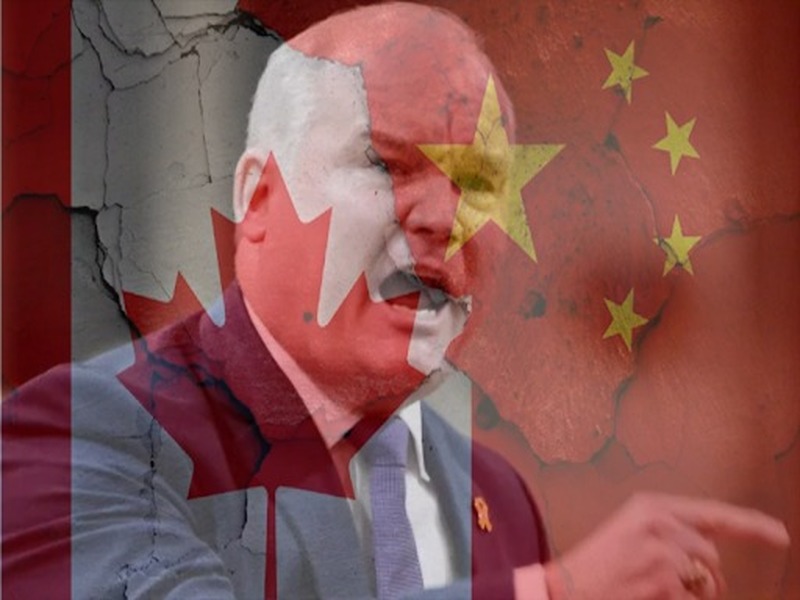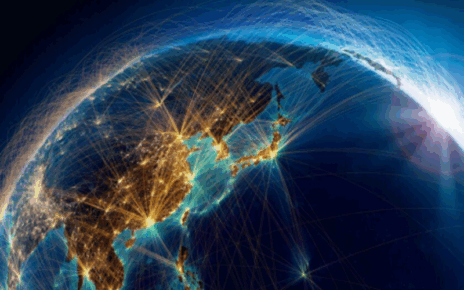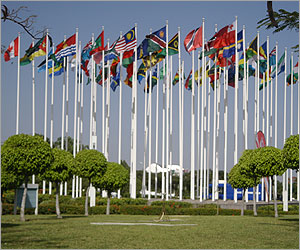Since the last Federal Election, only one major party has seen a leadership change (excluding, respectfully, the Greens). Erin O’Toole was elected as Leader of the Conservative Party in late August after centring his campaign on taxes, trade, national unity and social issues. Over the course of his candidacy, foreign and defence policy found limited room in the collection of matters raised in speeches or press – a trend that has continued in the short period following O’Toole’s assumption of leadership. Whenever they have found mention, however, the portfolios addressed have been detailed in substance, albeit limited in range. To that end, an examination of Erin O’Toole and the Conservative Party is due on the subject – to gain a better understanding of Canada’s self-designated “government-in-waiting” on foreign and security policy.
The ‘Dragon Slayer’: China and its Communist Party
By any measure, the signature piece of O’Toole’s foreign policy has been his position on China – where he considers the latter as Canada’s “greatest geopolitical issue”. O’Toole views the ruling Chinese Communist Party (CCP) as hostile to the post-war rules-based international order that Canada has long sought to maintain. To that end, O’Toole believes that a global alliance of nations must limit Chinese influence by confronting its activities across both foreign and domestic realms.
In pursuance of this strategy, O’Toole has proposed ‘Magnitsky Sanctions’ (i.e. human rights sanctions) against CCP and state leaders, including President Xi Jinping. Originally intended in response to China’s imprisonment of Canadians – Michael Kovrig and Michael Spavor – on espionage charges; their scope has since expanded to cover China’s limiting of political autonomy for the Hong Kong Special Administrative Region, detention of the Xinjiang Province’s ethnic Uighurs, counter-religious activities in Tibet and cybersecurity attacks on Canadian companies. In a domestic complement, O’Toole has proposed a counterintelligence effort to end CCP operations across Canada’s universities and Chinese diaspora communities; banning the telecommunications firm Huawei Technologies from providing 5G network infrastructure to Canadian firms; and a foreign agent registry for Chinese entities operating in Canada. Economically, in conjunction with his ‘Canada First’ policy, O’Toole has advocated a “decoupling” from China’s economy via new tariffs on manufactured goods – along with restricting acquisitions of Canadian companies by State and private entities. Furthermore, he has proposed lodging a formal dispute against China at the World Trade Organization for anti-competitive measures against Canadian canola exports and withdrawing from the Asian Infrastructure and Investment Bank – a Chinese multilateral initiative – which the Trudeau Government joined in 2018, and to which Canada is obligated to contribute C$2.9 billion in capital.
O’Toole’s policies, if implemented, would constitute the harshest Canadian posture towards China since the Immigration Act of 1923 (which banned Chinese immigration in totality). It differs starkly from the Trudeau Liberals’ current China policy, which – save for formal protest over Kovrig and Spavor’s detention – has sought closer relations with the People’s Republic, especially on economic matters. Under the current government, Canada’s China-bound exports have increased to C$23 billion, while Chinese international students have become integral to Canadian universities’ revenues – prompting a circumspect approach to China that seeks minimal displeasure of the Chinese State. This is best epitomized in Canada’s reluctance to ban Huawei equipment from its 5G network despite the requests of Five Eyes intelligence allies (the United States, United Kingdom, New Zealand and Australia).
In contrast, O’Toole’s diametrical and assertive position seeks political traction amidst widespread Canadian animus towards China over Kovrig and Spavor’s detention; and taps into longstanding North American anxiety over China’s economic and geopolitical growth – viewed at the expense of the former’s jobs and values. Already, O’Toole has received plaudits from Canadian human rights groups over his approach; and ventured into a further critique on China’s objectives for Arctic navigation and its Belt and Road Initiative’s predatory lending practices. Under an O’Toole government, one may expect Canada-China relations to deteriorate, while efforts towards Chinese containment in partnership with the United States and allies will deepen.
Israel, ‘Lynchpins’ and Conservative Orthodoxy
However, while O’Toole’s China policy has been well-developed, clear postures on other foreign policy questions have rarely been offered. During the campaign, O’Toole’s only other foreign affairs framework concerned Israel – touting the Conservatives’ support for the state, and their recognition of Jerusalem as its capital (a long-held position in the party since Stephen Harper’s leadership). To deduce his views on other matters, analysing O’Toole’s parliamentary statements as Shadow Foreign Affairs Minister under Andrew Scheer, press ‘scrum’ comments, and social media postings is necessary, given the absence of formal policy releases.
Such examination, inconclusive on most matters, yields a sketch of his views on NATO and defence policy. Recalling Winston Churchill’s comments on Canada’s role in NATO – as a “lynchpin” between Europe and the United States – O’Toole seeks to position Canada as a mediator between member-states on contentious issues whilst ensuring continued support for the Alliance. In conjunction, O’Toole seeks to ensure Canada spends 2% of its national product on defence – per the Alliance’s 2006 commitment – in part, by replacing its Victoria Class Submarine Fleet. As with Israel, his posture is largely congruent with past Conservative Party attitudes supportive of NATO and defence co-operation.
Conclusion: A Partial Policy
As O’Toole positions the Conservative Party to attempt to defeat the Trudeau Liberals next election he must, in addition to critiquing their record, present a comprehensive vision for Canadian foreign relations. China policy, while important, cannot be its sole component, with detailed proposals on core issues/regions – i.e. Canada’s role at the United Nations, Arctic Security and the Middle-East and Northern Africa – being necessary. Moreover, O’Toole must present a specific vision for NATO unity amidst the scepticism around the Alliance, with details on Canada’s efforts to reconcile tensions between members. Much of O’Toole’s appeal will depend on presenting this vision both swiftly and cogently, in line with Canadians’ expectations. To return to the opening analogy: while not yet in government, he cannot keep the people waiting.
Photo: Canada, China and Erin O’Toole (2020), by Arjun Singh. Used with permission.
Disclaimer: Any views or opinions expressed in articles are solely those of the authors and do not necessarily represent the views of the NATO Association of Canada.




